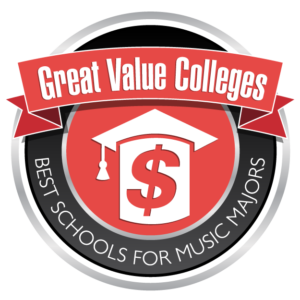
When researching the best music schools in the country, many hopeful music majors are faced with the high tuition and low acceptance rates of major music conservatories like Juilliard without realizing that there are a plethora of accessible and cheap colleges with good music programs.
While, for the purpose of this ranking, we did not discriminate between the types of schools, it’s important to understand that there is a difference when it comes to earning a music degree at a state school versus a private liberal arts college, a conservatory or even a university that has its own conservatory.
Featured Programs
Larger public universities run excellent programs through their music departments. Their students have the opportunity to have the “full college experience,” as well as the ability to expand their academic careers beyond performing arts. The curriculum at smaller college-level conservatories and music schools doesn’t stray from the performing arts, and these schools are typically more expensive and harder to get into. While students at conservatories and small, private schools don’t have the lifestyle choices of a large college, they are more likely to get individualized attention from high profile faculty members and occasionally free tuition. For those of you who want the best of both worlds, schools like the University of Southern California have a conservatory on campus. However, some students struggle to balance their general education requirements with their music school commitment.
In the end, each student planning to earn a degree in music should choose his or her school based on personal wants and needs, paying close attention to things like location, private lesson teachers for the desired discipline, class sizes, and post-graduation employment numbers. Today, those graduating with a degree in music learn the benefits of having versatile diplomas that reach beyond a performance program. Many of the best music schools on our list offer varying ranges of majors, like music education for those looking to become teachers, music business degrees, audio engineering/music production, music therapy, industry studies, and more. Some even offer or require their music majors to earn a double degree to better set them up for the working world.
Rating and Ranking Methodology
To develop this ranking of the top music programs, we used data from the National Center for Educational Statistics, Payscale.com, and each school’s website, calculating the most reputable program. In case of a tie, the more affordable program was awarded the higher ranking.
#25—Texas A&M University-Kingsville
Kingsville, Texas

The high standards set forth by Texas A&M University-Kingsville’s School of Music has yielded award-winning ensembles and solidified the university’s place among the best colleges for music in America. Undergraduate music students enrolled at the school can pursue either a general Bachelor of Music or a Bachelor of Music Education while graduate students enjoy more options, including:
- Master of Music in Conducting
- Master of Music in Music Education
- Master of Music in Performance
Texas A&M-Kingsville is institutionally accredited to award academic degrees in music by the Southern Association of Colleges and Schools Commission on Colleges. The music department itself is also programmatically accredited by the National Association of Schools of Music (NASM)
#24—Utah State University
Logan, Utah

Students enrolled in Utah State University’s Department of Music join a vibrant community of musicians and scholars studying various aspects of music, including performance, music education, and even music therapy. Housed within the Caine College of Arts, the department offers the following bachelor’s degrees:
- Bachelor of Music in Pedagogy
- Bachelor of Music in Performance and Pedagogy
- Bachelor of Music in Music Education
- Bachelor of Science in Music Therapy
- Bachelor of Arts in Music
Graduate students also have several options in terms of degree type and specializations. These include:
- Master of Music in Performance (with specializations in Guitar and Voice)
- Master of Music in Performance and Pedagogy (with an optional specialization in Piano)
- Master of Music in Conducting
Utah State University is institutionally accredited to offer these bachelor’s and master’s degrees in music by the Northwest Commission on Colleges and Universities. The school is also an accredited member of the National Association of Schools of Music (NASM).
#23—Western Washington University
Bellingham, Washington

The Department of Music at Western Washington University is housed within the school’s College of Fine and Performing Arts. Here, undergraduate music students will find a robust suite of music degree programs, including:
- Bachelor of Arts in Music
- Bachelor of Music in Composition
- Bachelor of Music in Music Education (P-12)
- Bachelor of Music in History & Literature
- Bachelor of Music in Performance
A minor in Jazz Studies is also available as is a master’s degree in music. Upon audition, eligible students may receive scholarships to help pay for their music education. Western Washington University is accredited by the Northwest Commission on Colleges and Universities to offer these academic credentials in music. Its music department also holds special accreditation from the National Association of Schools of Music (NASM).
#22—University of Nevada-Las Vegas
Las Vegas, Nevada

One of the leading colleges for music degrees in the nation, the University of Nevada-Las Vegas is home to a large and diverse student body. Students from all over the country and the world flock to UNLV to study music theory, performance, education, and more. For undergraduate students, there are five available degree options:
- Bachelor of Arts in Music
- Bachelor of Music in Music Education
- Bachelor of Music in Performance
- Bachelor of Music in Jazz Studies
- Bachelor of Music in Music Composition
Graduate students can also pursue master’s degrees in five different areas of study. Two doctoral programs are available as well:
- Doctor of Musical Arts in Applied Music
- Doctor of Musical Arts in Conducting
The Northwest Commission on Colleges and Universities has accredited UNLV to award these academic credentials in music at both the undergraduate and graduate levels. The school is also an accredited member of the National Association of Schools of Music.
#21—Central Washington University
Ellensburg, Washington

Boasting a low student to faculty ratio, Central Washington University is also home to a robust music department that offers both undergraduate and graduate degrees in music. For bachelor’s degree-seeking students, the following credentials are available:
- Bachelor of Music in Composition
- Bachelor of Music in Performance
- Bachelor of Music in Music Education
- Bachelor of Arts in Music
Five distinct options are offered to graduate music students, including:
- Master of Music in Pedagogy
- Master of Music in Performance
- Master of Music in Conducting
- Master of Music in Composition
- Master of Music in Music Education
Institutionally accredited by the Northwest Commission on Colleges and Universities, CWU is also an accredited member of the National Association of Schools of Music (NASM).
#20—University of Nevada-Reno
Reno, Nevada

The University of Nevada-Reno is one of the best colleges for music majors because of its 100% undergraduate placement rate. After graduating from one of three available bachelor’s degree programs, UNR music majors are placed by the university with schools, orchestras, bands, and graduate programs across the nation. Those who wish to continue their music studies in a master’s degree program have a few different options as well, including:
- Master of Music in Music Education
- Master of Music in Performance
- Master of Arts in Music
Students can apply for undergraduate scholarships as well as graduate assistantships to help fund their music education. The University of Nevada-Reno holds institutional accreditation from the Northwest Commission on Colleges and Universities. Its music department also holds programmatic accreditation from the National Association of Schools of Music (NASM).
#19—Morgan State University
Baltimore, Maryland

Students enrolled in Morgan State University’s Department of Fine & Performing Arts receive not only masterful instruction in music, but also a high-quality liberal arts education. Students majoring in music can pursue a specialization in one of three distinct areas:
- Instrumental Studies
- Keyboard Studies
- Vocal Studies
Twice as many concentrations are available for master’s degree students, including:
- Vocal
- Choral Conducting
- Sacred Music
- Instrumental
- Vocal
- Piano
Both undergraduate and graduate students are afforded numerous performance opportunities each year, including those that involve travel. Morgan State is a long-standing, accredited member of the National Association of Schools of Music (NASM). The school also holds institutional accreditation from the Middle States Commission on Higher Education.
#18—Texas Woman’s University
Denton, Texas

A top college for music majors, Texas Woman’s University promises to provide specialized music instruction with a strong liberal arts foundation. The school offers three different credentials for undergraduate students:
- Bachelor of Arts in Music
- Bachelor of Arts in Music Performance
- Bachelor of Science in Music Therapy
Graduate students will also find options for master’s-level studies, including programs in:
- Music Education
- Music Pedagogy
- Music Therapy
- Performance
In addition to institutional accreditation by the Southern Association of Colleges and Schools Commission on Colleges, TWU is also programmatically accredited by the National Association of Schools of Music and the American Music Therapy Association.
#17—Idaho State University
Pocatello, Idaho

The low student to faculty ratio at Idaho State University enables music majors to receive individualized attention as they pursue their academic credentials. The school offers four distinct degree choices for its undergraduates:
- Bachelor of Arts in Music
- Bachelor of Music Education
- Bachelor of Science in Music
- Bachelor of Music in Performance
A music minor is also available. For graduate students, a hybrid Master of K-12 Music Education can be pursued mostly online. Idaho State holds its institutional accreditation from the Northwest Commission on Colleges and Universities. It is also an accredited member of the National Association of Schools of Music (NASM).
#16—San Francisco State University
San Francisco, California

San Francisco State University has enjoyed accreditation from the National Association of Schools of Music since 1963. Since then, the school’s music department has expanded to encompass various liberal arts and professional degrees in music. For undergraduates, the following credentials are available:
- Bachelor of Music
- Bachelor of Music in Performance
- Bachelor of Music in Composition
- Bachelor of Music in Music History and Literature
Half a dozen different degree choices are available to graduate students, including:
- Master of Music in Conducting
- Master of Music in Chamber Music
- Master of Arts in Music Education
- Master of Arts in Music History
Ensembles are available in numerous music genres, including classical, jazz, and even Afro-Cuban. San Francisco State holds its institutional accreditation from the WASC Senior College and University Commission.
#15—California State University-East Bay
Hayward, California

A top music university, California State University-East Bay is home to a comprehensive undergraduate music program. Students seeking a Bachelor of Arts in Music can choose from four distinct concentrations:
- Instrumental/Vocal Performance
- Composition/Music Technology
- Music Education
- Liberal Arts
The music department at Cal State-East Bay also offers a certificate in music education and a music minor for its undergraduate students. For those who wish to pursue graduate studies in the discipline, a highly versatile Master of Arts in Music is also available. This advanced two-year program features six different areas of emphasis, including:
- Classical/Jazz Performance
- Music History and World Music
- Conducting Studies
- Music Theory
The university has been accredited by the National Association of Schools of Music since 1970. It also holds institutional accreditation from the WASC Senior College and University Commission.
#14—California State University-Fresno
Fresno, California

Recognized as one of the best colleges for music nationwide, California State University-Fresno offers undergraduate and graduate music credentials through its College of Arts and Humanities. Bachelor’s degree offerings include:
- Bachelor of Arts in Performance
- Bachelor of Arts in Music Education
- Bachelor of Arts in Music
- Bachelor of Arts in Composition
- Bachelor of Arts in Jazz Studies
A Master of Arts in Music is also available for graduate music students. All students enrolled in the university’s music program enjoy access to state-of-the-art facilities, including a 300+ seat concert hall, the expansive Wahlberg Recital Hall, and a digital recording studio. Cal State- Fresno is accredited by the WASC Senior College and University Commission, and the school’s music program is separately accredited by the National Association of Schools of Music (NASM)
#13—William Paterson University
Wayne, New Jersey

Located in a bustling metropolitan area, William Paterson University offers various top-rated music degree programs for both undergraduates and graduates alike. Standout programs for bachelor’s degree students include:
- Bachelor of Music in Sound Engineering Arts
- Bachelor of Music: Popular Music
- Bachelor of Music: Music & Entertainment Industries
A Music Honors program is also available. For students interested in a graduate degree program, options include:
- Master of Music in Music Education
- Master of Music in Jazz Studies & Arranging
- Master of Music in Jazz Studies & Performance
- MBA in Music & Entertainment Industries
This top college for music majors is accredited by the National Association of Schools of Music. The university also holds institutional accreditation to offer music degrees by the Middle States Commission on Higher Education.
#12—Western Connecticut State University
Danbury, Connecticut

With a low student to faculty ratio, Western Connecticut State University prides itself on being a student-centered institute of higher learning, and its music department is no exception. As a result, undergraduate music students build strong relationships with faculty members as they pursue bachelor’s degrees, such as:
- Bachelor of Arts in Music
- Bachelor of Music in Performance
- Bachelor of Music in Jazz Studies
- Bachelor of Science in Music Education
- Bachelor of Music: Audio and Music Production
A Master of Science in Music Education is also available at the graduate level. The New England Commission of Higher Education has accredited Western Connecticut State to confer these degrees in music. The department is separately accredited by the National Association of Schools of Music.
#11—University of North Dakota
Grand Forks, North Dakota

The University of North Dakota offers a variety of academic opportunities in music through its College of Arts & Sciences and the Department of Music. For undergraduate students, there are four degree options:
- Bachelor of Music in Music Education
- Bachelor of Arts in Music
- Bachelor of Music in Music Therapy
- Bachelor of Music in Performance
Graduate students have more choices, including:
- Master of Music in Composition
- Master of Music in Pedagogy
- Master of Music in Conducting
- Master of Music in Music Education
A terminal degree program is also an option: the Doctor of Philosophy (PhD) in Music Education. UND music students routinely have opportunities to travel for performances, even internationally. The University of North Dakota is fully accredited to award these academic degrees in music by The Higher Learning Commission. The music department is also separately accredited by the National Association of Schools of Music (NASM).
#10—Texas Tech University
Lubbock, Texas

The distinguished faculty at Texas Tech University’s J.T & Margaret Talkington College of Visual & Performing Arts School of Music has dedicated themselves to providing students with a comprehensive and diverse music education. Housing the largest collection of instruments in the region, the school provides bachelor’s degree-seeking undergraduates with five different options:
- Bachelor of Arts in Music
- Bachelor of Music in Composition
- Bachelor of Music in Performance
- Bachelor of Music in Theory
- Bachelor of Music (Teacher Certification)
Graduate students have even more options, including master’s and doctoral programs in composition, conducting, performance, and more. Texas Tech University holds accreditation from the Southern Association of Colleges and Schools Commission on Colleges to award these credentials in music. The school is also an accredited member of the National Association of Schools of Music (NASM).
#9—Lamar University
Beaumont, Texas

The Mary Morgan Moore Department of Music at Lamar University is housed within the school’s College of Fine Arts and Communication. The department offers four distinct bachelor’s degree programs:
- Bachelor of Music (Teacher Certification)
- Bachelor of Arts in Music
- Bachelor of Music in Composition
- Bachelor of Music in Performance
Opportunities for graduate study are also available. Students may pursue a Master of Music with tracks in Performance and Music Education. Several music scholarships are available through the department to help fund the cost of these degrees. Lamar University holds institutional accreditation from the Southern Association of Colleges and Schools Commission on Colleges. The school is also programmatically accredited by the National Association of Schools of Music.
#8—Wichita State University
Wichita, Kansas

Located in a metropolitan area devoted to the arts, Wichita State University offers numerous accredited music degree programs for its undergraduate and graduate students. Bachelor’s degree-seeking students have four options to choose from:
- Bachelor of Arts in Music
- Bachelor of Music Education
- Bachelor of Music in Composition
- Bachelor of Music in Performance
The school offers twice as many choices for graduate students, including:
- Master of Music in Opera Performance
- Master of Music in Piano Pedagogy
- Master of Music in History and Literature
- Master of Music in Conducting
Wichita State’s music department is home to state-of-the-art facilities, including concert halls, a chamber music venue, and recording studios. Faculty members also hold seats in renowned orchestras and ensembles across the country. The Higher Learning Commission has extended institutional accreditation to the university to award these academic credentials in music. The music department is separately accredited by the National Association of Schools of Music (NASM).
#7—California State University-Long Beach
Long Beach, California

Niche has ranked California State-Long Beach among the top 75 colleges in the nation for a music degree, and for good reason. The school boasts a comprehensive undergraduate and graduate music program, and its student ensembles have been heralded as some of the finest in the country. Music majors have five distinct degree choices through the Bob Cole Conservatory of Music:
- Bachelor of Music in Composition
- Bachelor of Music in Performance
- Bachelor of Music in History and Literature
- Bachelor of Music in Music Education
- Bachelor of Arts in Music
Even more options are afforded to graduate music students, including standout options like:
- Master of Music in Opera
- Master of Music in Jazz Studies
- Master of Music in Conducting
- Master of Arts in Musicology
Cal State- Long Beach has enjoyed accreditation from the National Association of Schools of Music (NASM) since 1968. The school holds institutional accreditation from the WASC Senior College and University Commission.
#6—Florida State University
Tallahassee, Florida

Florida State University has offered high-quality academic instruction for music students for the better part of a century. Today, music majors will find six different bachelor’s degree options, including:
- Bachelor of Music Education
- Bachelor of Music in Music Therapy
- Bachelor of Music in Music Theory
- Bachelor of Music in Composition
For graduate students, the options are even more plentiful and include numerous master’s and doctoral degrees. Examples include:
- Master of Music in Musicology
- Master of Music in Opera Production
- Doctor of Music in Performance
- Doctor of Music in Composition
An accredited member of the National Association of Schools of Music (NASM) since 1930, Florida State is also institutionally accredited by the Southern Association of Colleges and Schools Commission on Colleges. Niche has ranked the school among the top 35 colleges for music in America.
#5—University of Missouri-Kansas City
Kansas City, Missouri

As the University of Missouri System’s performing arts campus, UMKC offers top music degree programs through its renowned Conservatory. For undergraduates, bachelor’s degrees are available in six different fields of study, including:
- Music Education
- Performance
- Music Therapy
- Composition
These same disciplines can be pursued at the graduate levels, and additional areas of study for master’s degree students include:
- Musicology
- Music Theory
- Conducting
Doctoral students will find study options in:
- Music Education
- Performance
- Conducting
- Composition
The university maintains strong ties to the community and performs in over 500 different events annually. The Higher Learning Commission has extended full institutional accreditation to UMKC to confer these academic degrees in music. The school is also an accredited member of the National Association of Schools of Music (NASM). Niche has ranked the university among the top 100 best colleges for music in America.
#4—North Dakota State University
Fargo, North Dakota

The renowned Challey School of Music at North Dakota State University offers top music degrees at the bachelor’s, master’s, and doctoral levels. For undergraduate students, the school offers the following four-year degrees:
- Bachelor of Science in Music
- Bachelor of Arts in Music
- Bachelor of Music in Performance
- Bachelor of Music in Music Education
In addition, graduate offerings include:
- Master of Music in Performance
- Master of Music in Conducting
- Master of Music in Music Education
- Doctor of Musical Arts in Performance
- Doctor of Musical Arts in Conducting
The school offers a variety of scholarships based on both academic performance and financial need. NDSU is institutionally accredited by The Higher Learning Commission to offer these academic degrees in music. The music department holds separate accreditation from the National Association of Schools of Music.
#3—University of Houston
Houston, Texas

The music degree programs from the University of Houston are offered through the Kathrine G. McGovern College of the Arts and the Moores School of Music. The university’s music department is large, employing over 80 distinguished faculty members and serving over 500 undergraduate and graduate students. Undergraduate students can pursue one of half a dozen distinct credentials, including:
- Bachelor of Music in Music Theory
- Bachelor of Music in Composition
- Bachelor of Arts in Music
- Bachelor of Music in Performance
Graduate students have even more degree options, including master’s and doctoral degrees such as:
- Master of Music in Musicology
- Master of Music in Conducting
- Doctor of Musical Arts in Performance
- Doctor of Musical Arts in Composition
The University of Houston is institutionally accredited by the Southern Association of Colleges and Schools Commission on Colleges to award these music degrees. Its music department also holds programmatic accreditation from the National Association of Schools of Music (NASM). Niche has named UH one of the best colleges for music in the nation.
#2—Brigham Young University-Provo
Provo, Utah

Accredited by the National Association of Schools of Music, the distinguished School of Music at Brigham Young University-Provo is comprised of roughly 450 music majors as well as approximately 100 part-time and full-time faculty members. Students who desire to pursue an undergraduate degree in music will have several different choices, including:
- Bachelor of Arts in Music
- Bachelor of Music in Music Education
- Bachelor of Music in Performance
- Bachelor of Fine Arts in Music Dance Theatre
- Bachelor of Music in Composition
Graduate students have numerous options as well such as:
- Master of Music in Conducting
- Master of Music in Performance
- Master of Arts in Musicology
- Master of Arts in Composition
- Master of Arts in Music Education
In addition to degree programs, the university offers dozens of small and large ensembles to support students’ performance goals, including jazz, orchestra, opera, music dance theatre, and more. BYU is institutionally accredited by the Northwest Commission on Colleges and Universities to award both undergraduate and graduate credentials in music. Niche has ranked the school among the 40 best music colleges in America.
#1—San Jose State University
San Jose, California

The prestigious School of Music and Dance at San Jose State University currently enrolls approximately 350 music majors. Undergraduate students can choose from several different degree options, including:
- Bachelor of Arts in Music
- Bachelor of Music in Composition
- Bachelor of Music in Jazz Studies
- Bachelor of Music in Music Education
- Bachelor of Music in Performance
For graduate students, there are also numerous degrees available such as:
- Master of Music in Composition
- Master of Music in Conducting
- Master of Music in Jazz Studies
- Master of Music in Music History
- Master of Music in Music Theory
Students enrolled at both the undergraduate and graduate levels will have various performance opportunities through their participation in specific ensembles, including choral ensembles, chamber ensembles, bands, and orchestras. San Jose State is fully accredited by the Western Association of Schools and Colleges to award bachelor’s and master’s degrees in music. The school’s music department is separately accredited by the National Association of Schools of Music (NASM).
About Undergraduate Degrees in Music

Are you passionate about music and looking for a way to channel your enthusiasm into a lucrative career? An undergraduate degree in music is your ticket to success in the industry. Though associate’s credentials in music are available, far and away, the most popular and promising undergraduate degree you can pursue in the field of music is the bachelor’s degree. These are typically four-year degrees available from conservatories as well as liberal arts colleges and universities. Most music degree programs are available on campus only as they require substantial hands-on instruction and performance training in ensembles such as bands, orchestras, and chambers.
Types of Bachelor’s Degrees in Music
Though all bachelor’s in music degrees are appealing in their own right, they are not all the same. In fact, there are several different four-year credentials available to music majors. These varied options require unique coursework and prepare students for distinct career pathways. Thus, if you’re considering an undergraduate music degree, it’s important to know what types of credentials are available and how they differ from one another. Some of the more popular options available to music majors include:
- Bachelor of Music (BM)
- Bachelor of Arts (BA) in Music
- Bachelor of Science (BS) in Music
- Bachelor of Music Education (BME)
Bachelor of Music Degrees: Admission
For most undergraduate degree programs, the admissions process is fairly standard. Gaining entry into a bachelor’s in music degree program is different, though. In addition to submitting basic documentation such as your high school academic transcript and college entrance exam scores, you will most likely be required to audition for a seat in your chosen undergraduate music program. This audition process can be intense and competitive, depending on the school you’re applying to. In addition to a successful audition, other common admissions criteria for undergraduate music programs include:
- Minimum high school GPA (around 3.0)
- SAT/ACT scores
- Letters of recommendation
- Personal essays/statements
Bachelor’s in Music Programs: Curriculum
Regardless of which type of bachelor’s in music degree program you elect to pursue, you can expect to be required to fulfill approximately 120 credit hours of coursework. Though the bulk of this coursework will be directly related to your major, you will likely be required to take some general education courses in academic areas such as the humanities, social and behavioral sciences, mathematics, and more.
The major-specific classes you’re required to take as part of your undergraduate music degree plan will depend on the precise type of bachelor’s degree in music you’re pursuing as well as any concentrations or areas of emphasis you elect. To give you a rough idea of the types of classes you may encounter, we’ve listed some sample course titles below. These are taken from actual bachelor’s of music degree offerings.
Sample Bachelor of Music Degree Course Titles

- Composition, Orchestration and Arranging
- Music Career Management
- Piano Skills
- Music History and Literature
- Sight Singing/Ear Training
- Introduction to Conducting
- Chromatic Harmony
- Music Theory
- The Classical Canon
Popular Concentrations for Music Majors
It doesn’t take a degree in music to know that this creative discipline is a broad one. In addition to the numerous instruments one can choose to play, there are various aspects of the music field you can decide to study. That’s why many undergraduate music programs enable students to concentrate their studies in a specific musical specialty or emphasis area. Below, our editors will detail some of the more popular concentrations available to music majors.
Music Education
A bachelor’s degree in music with a concentration in Music Education prepares graduates to teach music in public and private schools. These degree plans may or may not lead to teacher licensure or certification, depending on the program. Those music students who elect a specialization in Music Education can expect to take classes such as:

- Ethnomusicology in the Schools
- Techniques for Teaching Music to Children
- Introduction to Access and Equity in Music
Music Therapy
Undergraduate music degree plans with a concentration in Music Therapy positions graduates to work in a clinical setting, applying principles of music therapy to treatment plans for patients dealing with a range of mental health conditions and disorders from dementia to depression. Students who choose a concentration in Music Therapy will take courses such as the following:

- Clinical Orientation to Music Therapy
- Improvisation Methods in Music Therapy
- Music Therapy Research
Performance
Undergraduate music majors who want to perform professionally after graduation may consider a bachelor’s degree in music with a concentration in Performance. Students who elect this specialization often major in a specific sub-field of music performance such as voice, piano, or instrumental, for example. Classes comprising such a specialization may include:

- Tonal Harmony and Composition
- Harmonic Considerations in Improvisation
- Aural Skills
Composition
Music majors who dream of writing music as opposed to performing it will want to consider a bachelor’s degree in music with a concentration in Composition. Degree plans in Composition often include classes like those listed below:

- Instrumentation and Score Preparation
- Contemporary Techniques in Composition
- The Physics of Music
Music Industry/Music Business
An undergraduate degree in music with a concentration in Music Industry or Music Business prepares graduates to perform business operations within the music industry, including those related to music marketing, music production, and music distribution. Course titles comprising a degree of this nature may include:

- Music Industry Law and Ethics
- Computer Applications in the Music Business
- Music Product Development
Frequently-Asked Questions About Undergraduate Degrees in Music
Q: Is a music degree worth it?
A: There is an unfortunate misconception that music degrees are worthless. While this certainly isn’t the case, only you can decide whether an undergraduate music degree is worth investing time, effort, and money. Though bachelor’s degree programs in music can be rigorous, the payoff for graduates is often a rewarding career, both financially and personally.
Q: How long does it take to earn a bachelor’s degree in music?
A: The standard completion time for a bachelor of music degree program is four years. There are factors that could affect the length of your program, though, such as how many classes you take per term and whether or not you choose a dual major or other specialized courses of study.
Q: Can I earn an undergraduate music degree online?
A: Online bachelor’s degree programs in music do exist, but they are not very common. If you’re considering distance learning for your undergraduate music education, you must weigh any potential drawbacks such as loss of experiential learning and performance opportunities.
Q: Are part-time bachelor’s in music programs available?
A: Most undergraduate music degree programs require a full-time commitment, but there are exceptions. If you plan to study music part-time, keep in mind that this could increase the duration of your degree program.
Q: Is there a standard accrediting body for music degree programs?
A: Yes. The accrediting agency for music degree programs in the United States is the National Association of Schools of Music (NASM). All schools featured in this ranking hold official NASM accreditation.
Career Questions About Bachelor’s Degrees in Music
Q: What can I do with a bachelor’s in music credential?
A: Contrary to popular belief, a wide variety of career choices are associated with an undergraduate degree in music. Some popular career paths include a music teacher, performer, composer, producer, and music therapist.
Q: How much will I make with an bachelor’s in music degree?
A: It isn’t easy to predict. Pay will vary depending on the precise type of undergraduate degree in music you hold and your terms of employment and geographical area. Still, PayScale reports the average salary for professionals with a Bachelor of Arts in Music to be just over $60,000 per year.
Q: Are music degrees in demand?
A: Though jobs for musicians and singers are growing slower than the average occupation, according to the Bureau of Labor Statistics (BLS), other careers requiring a bachelor’s degree in music are, in fact, in demand. For example, the job prospects for music teachers and music therapists are promising.
Q: What professional organizations should music majors/graduates join?
A: Dozens of professional organizations and associations exist in the field of music. Some of these are listed below for the sake of reference:
- Association of Music Producers
- National Association of Music Merchants
- Association of Independent Music Publishers
- National Association for Music Education
- American Music Therapy Association for Students
- International Society for the Performing Arts
- American Federation of Musicians
References:
- National Center for Education Statistics: College Navigator
- The National Association of Schools of Music
- Niche: 2021 College Rankings
Related Resources:
- Great Value Colleges for Music Majors
- 10 Great Reasons to Major in Music
- 9 Cool Careers You Can Pursue With a Music Degree
- Great Value Colleges Music Scholarship for Black Students
Additional Sources:
